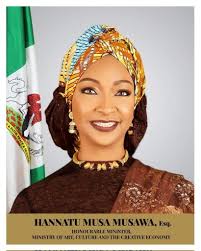The Federal Government has unveiled fiscal plans to generate at least $100 billion and create two million jobs yearly from the rapidly growing Nigeria’s creative industry.
The Minister of Art, Culture and Creative Economy, Hajia Hannatu Musawa, unveiled the fiscal plan and strategic roadmap on Wednesday during a roundtable session organized for local and foreign investors in the creative industry in Abuja.
Specifically, the minister listed some of the key objectives of the Plan, if well implemented, as including huge non-oil revenue generation and job creation on a sustainable basis for the country.
Noting that despite the Creative Economy’s invaluable potential to add value to the nation’s Gross Domestic Product (GDP), Musawa lamented that currently the creative industry’s contribution to the economy stood at a mere $5 billion annually.
According to her, the industry’s full potential in terms of revenue generation and job creation could be fully tapped if the sub-sectors comprising music (sound recording, live performances and music videos, visual media (movies, TV shows, comedy shows, podcasts, content creation), visual arts and crafts (canvas painting, design, sculpturing, woodwork and other craft works), heritage and museums, culinary arts, fashion, publishing books, literary arts, poetry, magazine, etc) and video gaming are prioritized in terms of investment and capacity building of the players.
The minister hinted that as part of its efforts to meet the revenue and job creation targets in the creative industry the minister had identified 14 key initiatives that would serve as catalysts to boost the industry’s growth.
She grouped the initiatives under four major pillars namely, Technology, Infrastructure and Funding, International Culture Promotion, and Intellectual Property Monetization.
The minister further clarified: “Under International Culture Promotion, the Ministry will establish a culture promotion office collaborating with Nigerian embassies abroad, to promote Nigerian arts, culture and creative economy, and leverage AfCTA to boost Nigerian creative output export regionally and globally.
“For Intellectual Property Monetisation, the Ministry will seek to establish Globally standardized CMOs (Collective Management Organisations) for most of the sectors, launch a Copyright Oversight Initiative in partnership with the Nigeria Communications Commission (NCC) to enhance tracking, monitoring, and enforcement of copyright standards, ensuring CMOs’ adherence to CISAC standards.
“It will also develop and implement the intellectual property framework and operationalize Nigeria’s IP licensing framework”, Musawa added.






